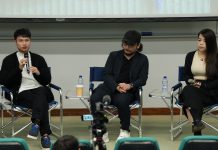Francis Ngai Wah-sing, founder of Social Ventures Hong Kong (SVHK) and co-founder of Green Monday, has a different view. He prefers carrots to sticks and suggests introducing incentives for people to change their habits.
Ngai’s Green Monday project is a social start-up under SVHK to promote green, healthy and sustainable living through encouraging people to give up meat on Mondays.
He says Green Monday stresses the importance of making first steps.
For instance, tasty plant-based menus could be provided as incentives to persuade people to take “baby steps to go green”. Many restaurants, schools, government departments and the Legislative Council have worked with Green Monday and embraced its idea. Ngai describes it as “earth day every week” and says it is a start in raising people’s awareness.
“All people will tell you environmental protection is right. They know how to do it, and do it conveniently,” says Ngai. “But how many would stay committed to a daily habit of doing it? Awareness is not the most important matter now. It is more important for us to find easy approaches for action.”
The key, for Ngai, is to offer people convenient, fun and innovative ideas to help save the planet. SVHK is also working on Bottless, a project to encourage people not to use disposable plastic bottles. The team wants to launch a Bottless map, to show people where they get access to free water refill stations in offices and restaurants. People would then bring their own bottles and refill their water at participating sites across the city.

“I think the problem is not a lack of knowledge, but how to find an easy way [to achieve what we know],” Ngai says.
These efforts are commendable, but for Edward Yiu Chung-yim, an associate professor in the Department of Geography Resources Management at the Chinese University of Hong Kong, they do not go far enough.
Yiu questions the prevailing notions of environmental protection.
“It is very pathetic to believe that you have already saved the earth after you recycled the rubbish you have created,” he says, adding that people often dismiss the importance of reducing consumption to achieve environmental protection.
For Yiu, the way to solve the problem thoroughly is to reduce waste at the source. However, he says the government is reluctant to promote this message because it usually takes the interests of business into account when promoting environmental protection.
He says this can be seen in the government’s common practice of encouraging people to buy environmentally friendly products.
“You are buying new products while throwing away old ones. That is what we regard as ‘fake environmental protection’,” he says. “On the surface, you have reduced carbon emissions, but in fact some new interest groups profit in the process.”
Reducing consumption poses a threat to the economy and Yiu believes this is why governments and businesses around the world spread what he says is a misleading concept of environmental protection.
“They are deliberately releasing incomplete information because they don’t want people to reduce consumption,” he says.

Yiu acknowledges there is a need to balance environmental protection with economic development, but this is no easy task. Therefore, education should take priority in the long run.
“It is important to know the truth which the authorities are hiding from you first. Putting things into action is another matter,” he says.
Yiu put forward his vision for environmental sustainability in a 2013 conference paper outlining a framework for “four zeros”– zero waste of energy, zero waste of food, zero waste of water and zero waste production.
To put his ideas into action he launched the “Four Zero Scheme” in Chi Fu Fa Yuen, where he lives, by forming a green group. Members have introduced an aquaponics system and organic farming on the estate. There is also a corner where people can share one copy of a newspaper and ride a bicycle to generate electricity.
You could say this is his version of Green Monday founder Francis Ngai’s baby steps. Yiu describes it as a social experiment which shows how a city can be sustainable through generating its energy and making use of the waste it produces. He hopes the project can become a model for other residential estates in Hong Kong and encourage us all to reduce waste at the source.
Edited by Kelly Wong






































